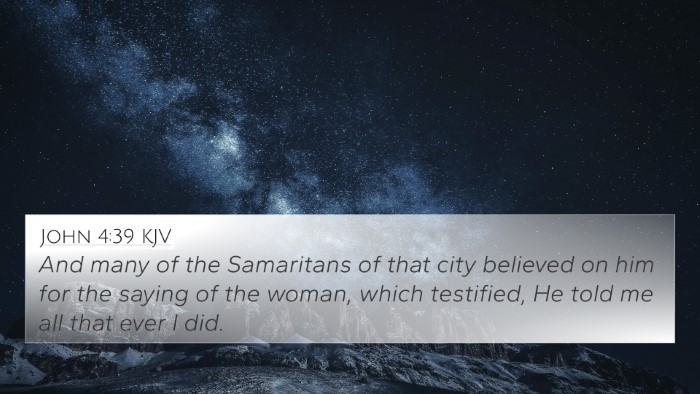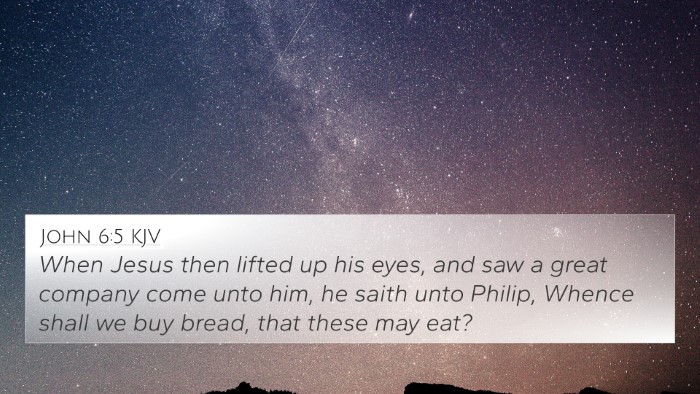Understanding John 4:8
John 4:8 states: "For his disciples were gone away unto the city to buy meat." This verse provides context for Jesus’ conversation with the Samaritan woman at the well and highlights the themes of nourishment, spiritual thirst, and the mission of Jesus.
Summary of John 4:8 Meaning
In this verse, the absence of Jesus' disciples serves a dual purpose; it illustrates their practical concerns regarding daily needs while simultaneously freeing Jesus to engage in a transformative dialogue with the Samaritan woman. By understanding this interplay, readers can infer several layers of meaning, which we will explore.
Commentary Insights
-
Matthew Henry: Henry emphasizes that Jesus' conversation with the woman was not only significant for her but also revealed the disciples' preoccupation with earthly matters. This contrast illustrates that while they focused on physical sustenance, Jesus was about to unveil deeper spiritual truths that transcend their immediate concerns.
-
Albert Barnes: Barnes highlights the importance of timing in this scripture. The fact that the disciples departed reflects their ordinary human priorities, which serves as a backdrop for Jesus, who operates according to a higher purpose—spiritual nourishment for those in need.
-
Adam Clarke: Clarke comments on the cultural implications of the disciples' absence, suggesting that their departure allowed Jesus to engage more freely with a Samaritan, showcasing the breaking of social norms and barriers as part of the mission to reach all humanity.
Thematic Connections
This verse opens doors to numerous thematic Bible verse connections, illustrating the dichotomy between physical and spiritual realities in the teachings of Christ.
Bible Verse Cross-References
- John 6:35: Jesus declares Himself as the bread of life, emphasizing spiritual sustenance over physical hunger.
- Matthew 4:4: "Man shall not live by bread alone..." highlights the necessity of spiritual nourishment.
- John 7:37-38: The invitation to come and drink illustrates the theme of spiritual thirst and fulfillment.
- Luke 19:10: The purpose of Jesus’ mission—to seek and save the lost—aligns with His conversation with the woman at the well.
- Romans 10:14-15: Discusses the need for messengers, relating to the disciples’ commission compared to Jesus’ immediate missionary act.
- Acts 1:8: Jesus promises power for the mission, which resonates with spreading the Gospel beyond cultural confines.
- 2 Corinthians 5:16-17: Emphasizes transformation in Christ, echoing the transformative nature of Christ’s engagement with individuals.
Connections Between Bible Verses
The connections between these verses are profound and illustrative of the overarching biblical narrative about Jesus’ ministry and mission. When analyzing John 4:8 alongside these references, one can see a thematic continuity regarding spiritual hunger and the call to mission.
Comparative Bible Verse Analysis
A deeper look into the comparative analysis between these scriptures reveals a rich tapestry of inter-Biblical dialogue. These connections highlight the recurring need for spiritual sustenance over physical, the breaking of societal norms, and the transformative nature of Jesus' interactions.
Tools for Bible Cross-Referencing
Utilizing resources such as a Bible concordance and Bible cross-reference guide can greatly enhance your understanding of scripture. They allow you to see how different verses relate and support each other, enriching your study and appreciation of the Biblical text.
How to Use Bible Cross-References
To effectively leverage cross-referencing Bible study methods, look for common themes, keywords, and narratives that link verses together. This not only deepens comprehension but also fosters a holistic view of scriptural teachings.
Bible Reference Resources
A variety of bible reference resources exist for those wishing to explore scripture more deeply. These materials can help draw connections between verses and facilitate broader contextual understanding.
Conclusion
John 4:8 invites an exploration of spiritual themes contrasted against physical realities. The insights from Matthew Henry, Albert Barnes, and Adam Clarke emphasize the importance of focusing on spiritual sustenance and the broader mission of Jesus. Engaging with cross-references enriches one's understanding, making scripture a living, breathing document that speaks across time and cultures.






